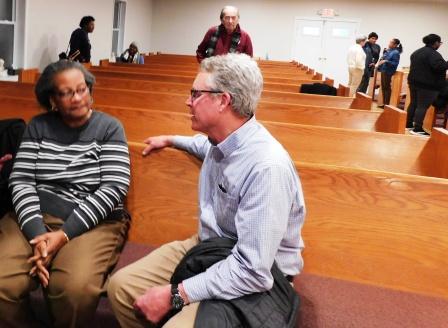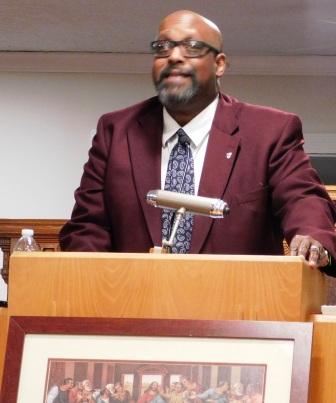Mary Potter
Sunday, February 23, 2020 6:16 pm
|
(Clinton, KY) - Many of us attending Dr. Brian Clardy's Black History Month program at Green Valley Missionary Baptist Church on February 20th thought we knew history. It turned out that we knew some correct history but much that was not. Dr. Clardy knows a whole lot more. Fortunately for the thirty or so who attended, he was willing to supplement our lack of information.
Doctor Clardy, a full time history professor at Murray State University, has written several books and articles. He is active in his community and in his church. Recently, Governor Beshear named him to the Kentucky Humanities Council. A native of South Fulton, Dr.Clardy brought his mother, Ginger Clardy, to the program where she was able to visit with one of his high school classmates, John Varden, now pastor of the First United Methodist Church of Clinton. 
The roots of the month long commemoration began as "Negro History Week" created by Dr. Carter G. Woodson, founder of the "Journal of Negro History". While the week has grown into a month, Clardy noted wryly that "We have relished in our collective historical memory of these great accomplishments as if they were an anomaly, as if they were some occurrence of happenstance.
And when the clock strikes midnight on March 1, 2020, we will never hear those names again until next February."
Dr. Clardy expressed amazement that textbooks still "blatantly ignore the contributions of African Americans to the larger American story. He recounted that the history of slavery and the Civil War were misleading. The enslavement of the African American was "benevolent" and the Civil War was a Confederate effort was to preserve "States' Rights" only. As he learned more, he just knew textbooks in the would have to change. But they have not.
He explained that slavery did not begin with America - and with Brazil ending the practice in 1888, America was not the last to outlaw the practice. Europe, beginning with Portugal, jumped into the slave trade early in the 17th century. There was "money to be made".
Arab slavers sold captured young men, women and children at markets attended by Europeans. The slaves were transported to the Americas and Caribbean Islands to work on plantations. Millions died en route to the New World.
Unlike what many of us were taught, the earliest cash crop in America was not cotton, but tobacco. The earliest farm workers were indentured servants from European counties who paid their way to the New World by their labor. When their agreed time was up, they were free to leave their employer. While the indentured servant practice gave the indentured a path to freedom, slavery did not. Slaves could not buy their way out. They could be sold in families or broken up.
 Reconstruction after the Civil War was abandoned leaving black men, women and children to be murdered with impunity. The murder of the Walker Family as close as Hickman (in Fulton County) in 1908.was never solved. The perpetrators of the crime were never brought to justice. The lynching of Jim Stone in Mayfield garnered national attention in 1896.
Reconstruction after the Civil War was abandoned leaving black men, women and children to be murdered with impunity. The murder of the Walker Family as close as Hickman (in Fulton County) in 1908.was never solved. The perpetrators of the crime were never brought to justice. The lynching of Jim Stone in Mayfield garnered national attention in 1896.
Dr. Clardy finished his prepared remarks with three conclusions:
- 'In remembering our collective past, we must consider how far we have made it by God's Power and might;
- We must remember our collective accomplishments and how we have the spiritual fortitude to write the next chapter in America's story;
- Finally, we must remember that dark and disturbing chapers that have also formed a part of this larger story of our past. Not to exact retribution, but to force our collective national discourse to focus on intellectual honesty, rather than to promote false narratives that blind a nation to its bloody history. Moreover, that the next generation cannot forget, but to draw from its lessons."
The question and answer time proved to be lively and informative. Jerome Jenkins brought up the question reparations for slavery. Dr. Clardy said they would continue to be discussed but implementation will be very difficult.
Jenkins responded that "he was still waiting for his 40 acres and a mule" to the laughter of the audience.
Howard Dillard spoke of his time as a young soldier going to Vietnam. The young draftee was put on a train and was not allowed off or to look out the windows until he reached his army base in Mississippi. Coming back from Vietnam left Dillard angry and militant.
When asked about the quality of the students he teaches in his history classes at Murray State, Clardy said they were better informed than previous students. They "listen to podcasts and read online." Recalling the recent speech by Admiral McRaven at Murray State a few nights previously, Clardy said there were students present for a grade, but many were there to hear the speech.
Green Val ley Missionary Baptist Church Pastor Eugene McDonald told the story of how as a youth he talked to a white girl on the phone. When she found out, his grandmother cautioned him not to get involved with white men's politics or with white women. He added "that was their generation".
ley Missionary Baptist Church Pastor Eugene McDonald told the story of how as a youth he talked to a white girl on the phone. When she found out, his grandmother cautioned him not to get involved with white men's politics or with white women. He added "that was their generation".
After the program, guests visited in the fellowship hall and stories were told of growing up in the area. Some were amusing. Others confirmed that there is more work to be done to overcome the prejudices of the past.
